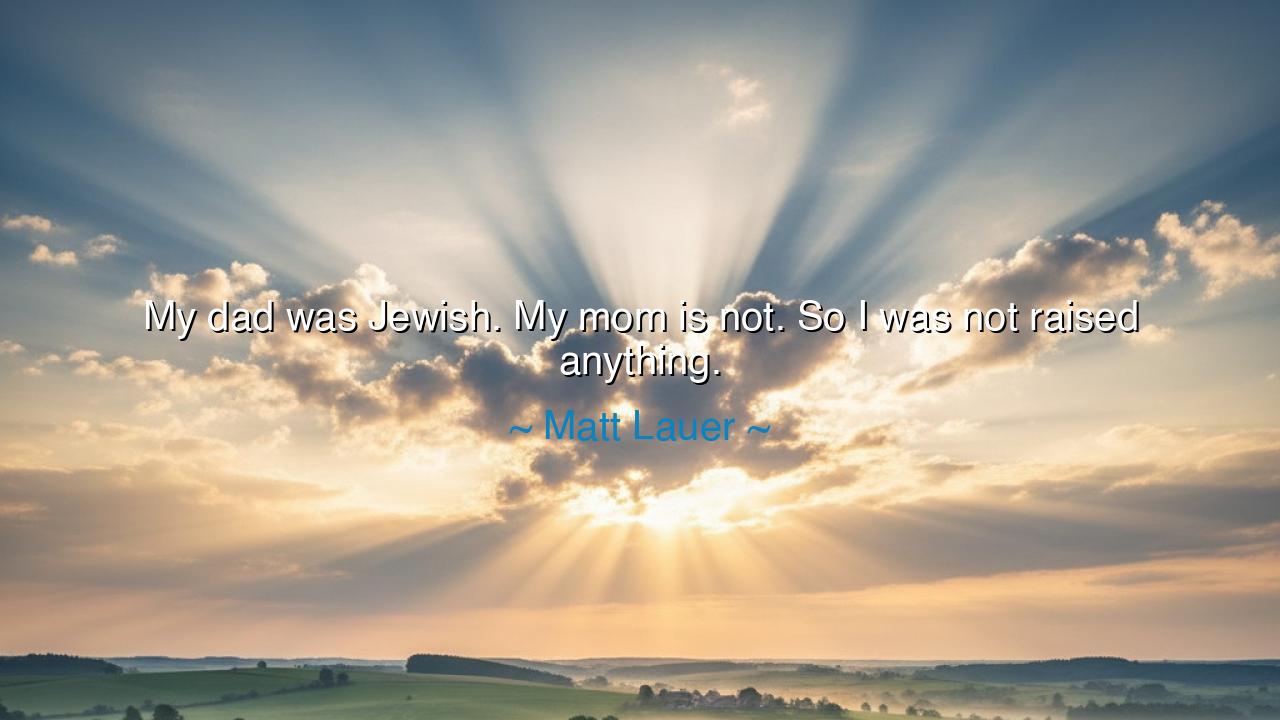
My dad was Jewish. My mom is not. So I was not raised anything.






In the words of Matt Lauer: “My dad was Jewish. My mom is not. So I was not raised anything.” — we hear not merely a confession of lineage, but the quiet ache of spiritual displacement. It is the voice of one born between two worlds, neither wholly belonging nor entirely estranged. His statement carries the stillness of one who has stood at the crossroads of belief, hearing two hymns sung in opposite directions, yet learning neither melody long enough to call it his own.
In the ancient days, the wise spoke of identity as the thread that binds the soul to the heavens. When that thread frays, a man may walk the earth surrounded by all faiths yet find no altar to kneel before. To be “not raised anything” is not simply to lack religion — it is to grow without the sacred compass that orients one’s spirit toward purpose. It is like a ship adrift between shores, with the winds of culture on one side and the tide of doubt on the other.
Consider young Siddhartha, before he became the Buddha. Though born into luxury and promise, he too found himself estranged from the teachings of his people. His father sought to shield him from suffering, from sickness, from the truth. Yet Siddhartha felt the void of false peace, and it was that emptiness — that same emptiness of being “not raised anything” — that drove him to seek the Middle Way, the truth between extremes. In him we see the same paradox that Matt Lauer’s words unveil: that sometimes, to find what is divine, one must first be lost.
The modern man often inherits the confusion of divided ancestry. He may have a Jewish father, a Christian mother, a world whispering a thousand doctrines — yet his heart becomes a quiet plain where none of them take root. And yet, from such soil, something rare may grow: a belief not inherited but chosen. For when one is denied the simplicity of certainty, one learns the courage of seeking. The one who is “not raised anything” becomes the pilgrim of truth, and every sunset, every birth, every act of kindness becomes his scripture.
We might recall the tale of Marcus Aurelius, the Roman emperor who, though surrounded by gods and temples, found solace not in the rituals of men but in the discipline of the mind. He too was “not raised anything” in the strictest sense; his faith was carved through reason, his prayers spoken in silence. Yet his Meditations remain a sacred text for the restless spirit. It is proof that faith is not always a matter of inheritance — it may be the art of building a temple within one’s own soul.
From this we learn: the absence of religion is not the absence of meaning. It is a test — a trial of the self. The man who is “not raised anything” is called not to worship blindly, but to forge his own covenant with truth. Like the smith who tempers his blade in fire, so must he temper his soul through reflection, through compassion, through the humble art of listening to the still voice within.
So let this be the lesson for all who wander in the wilderness of uncertainty: Do not curse your emptiness; sanctify it. Fill it with curiosity, with kindness, with the light of your own choosing. Seek to understand the faith of others, but do not kneel until your heart commands you to. For in the end, the divine does not dwell in the creeds of our fathers or the traditions of our mothers — it dwells in the courage to ask, to love, to create meaning where none was given.
Therefore, when you hear the words, “I was not raised anything,” do not hear despair. Hear the whisper of beginning. For it is from the void that creation speaks, and from silence that the soul first learns to sing.






AAdministratorAdministrator
Welcome, honored guests. Please leave a comment, we will respond soon